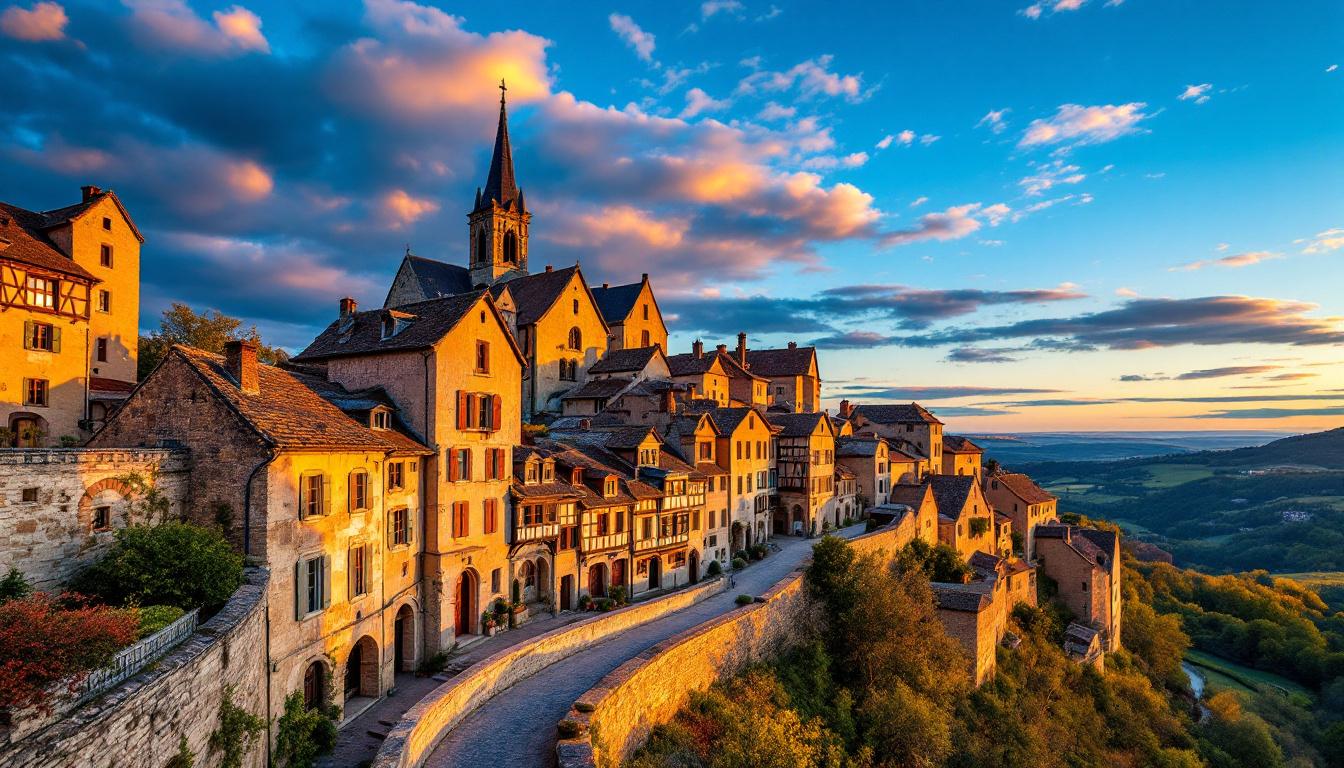Stepping through Pérouges’ medieval gates feels like discovering a secret passage through time. This tiny French village of just 80 residents in its historic center preserves what Tuscany lost centuries ago to tourism and modernization.
While San Gimignano drowns in tour buses and Montepulciano sells mass-produced trinkets, Pérouges quietly maintains living medieval traditions that transform visitors into cultural guardians. The cobblestone streets whisper stories that locals have protected for over 500 years.
Just 40 minutes from Lyon, this fortified hilltop village offers what no Tuscan destination can anymore: authentic medieval life practiced by artisans who’ve inherited their crafts through generations, not tourism schools.
The medieval atmosphere Tuscany commercialized away
Authentic artisan workshops where history lives
Behind weathered wooden doors, master craftspeople practice stained glass, ceramics, and bookbinding using techniques unchanged since the 15th century. Unlike Tuscany’s tourist-focused pottery demonstrations, these workshops serve the community’s daily needs while welcoming respectful visitors into their creative sanctuaries.
Stone houses that shelter living history
Pérouges’ timber-framed stone dwellings house actual residents, not vacation rentals or souvenir shops. Families who’ve lived here for generations maintain their homes using original construction methods, creating an atmosphere of genuine medieval domesticity that disappeared from Tuscany decades ago.
What happens when locals guard their heritage
The community that chose authenticity over profit
Pérouges residents collectively decided to limit tourism development to preserve their village’s soul. This protective stance means no chain restaurants, no tour bus parking, and no mass-produced medieval costumes – just authentic craftspeople sharing their inherited knowledge with visitors who show genuine respect.
Medieval festivals that celebrate, not exploit
Each June, the village transforms into a living history experience where locals portray their ancestors – nobles, merchants, bakers called “talmeniers.” These aren’t professional actors but residents sharing family stories passed down through centuries, creating emotional connections impossible in commercialized medieval sites.
The exclusive experiences mass tourism destroyed elsewhere
Galette de Pérouges made from secret recipes
The village’s signature medieval almond tart follows recipes known only to local families, prepared in kitchens that have served the same function for 500 years. While Tuscan restaurants serve “traditional” dishes adapted for international palates, Pérouges maintains culinary authenticity that transforms food into cultural transmission.
Ramparts that protect more than stones
The intact 15th-century fortifications encircling Pérouges don’t just preserve medieval architecture – they protect a way of life. These walls create physical and psychological boundaries that help residents maintain their community’s character against pressures that transformed Tuscany’s hill towns into outdoor museums.
Why this matters for cultural travelers
The responsibility that comes with discovery
Visiting Pérouges means becoming a cultural steward rather than a tourist consumer. The village’s preservation depends on visitors who understand they’re witnessing something precious and fragile – authentic medieval culture surviving in an increasingly homogenized world.
Access that requires respect
Pérouges opens its doors to travelers who approach with reverence for living history. The artisan workshops welcome visitors year-round, offering hands-on experiences with medieval crafts while funding the continuation of these ancient traditions through respectful cultural exchange.
Unlike Tuscany’s transformed hill towns, Pérouges proves that authentic medieval culture can survive modernity when communities prioritize heritage over profit. The village exists as a living testament to what’s possible when locals guard their cultural treasures with fierce dedication.
Plan your visit during shoulder seasons when workshops operate fully but crowds remain minimal. Bring respect, curiosity, and support for local artisans who’ve chosen to preserve rather than exploit their extraordinary medieval inheritance for future generations who still believe in authentic cultural experiences.
Frequently asked questions about visiting Pérouges
How do I reach Pérouges from Lyon?
Drive 40 minutes northeast via A40 motorway, or take regional buses that operate seasonally. Most visitors rent cars for flexibility exploring the Ain region’s other preserved medieval sites.
When are the artisan workshops open?
Most workshops operate year-round with exhibition spaces always accessible. Hands-on craft experiences and internships require advance booking through the village tourism office, especially during peak cultural seasons.
What makes Pérouges different from other French medieval villages?
Pérouges maintains active artisan traditions rather than just preserving buildings. The community of 80 residents in the historic center actively practices inherited crafts while limiting development that might compromise their cultural authenticity.
